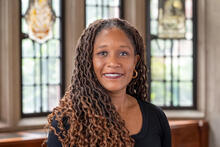Christen Smith, Ph.D., Cultural and Social Anthropology, Stanford University
Dr. Christen A. Smith is a Black feminist and African diaspora anthropologist whose work explores the multi-sided dimensions of race, gender, violence, performance and Blackness in the Americas. Her research and writing is two-pronged. She studies the transnational, gendered, politics of anti-Black state violence in Brazil and the Americas—particularly with regard to policing; and Black women’s intellectual contributions to the Americas, especially related to transnational Black feminism. In 2017, Professor Smith started Cite Black Women.—a transnational initiative that brings awareness to society’s gross tendency to ignore Black women’s intellectual contributions and not to cite Black women inside and outside of the academy.
Prof. Smith is the author of the book, Afro-Paradise: Blackness, Violence and Performance in Brazil (University of Illinois Press, 2016), which examines police violence in Brazil and Black community responses to it through the lens of the theater and performance. She is the co-author of the book The Dialectic is in the Sea: The Black Radical Thought of Beatriz Nascimento (Princeton University Press, 2023), the first book to curate and translate the writings of the paradigmatic Black Brazilian scholar Beatriz Nascimento into English. She is also co-editor of Black Feminist Constellations: Black Women in Dialogue and Translation (University of Texas Press, 2023), a collection of Black feminist reflections from Latin America and the Caribbean, co-edited with Lorraine Leu. Smith’s fourth book, Frequency: Black Women in the Atlantic is a meditation on Black women’s experiences with violence and freedom in the Atlantic world. Frequency is currently under contract with Duke University Press.
Professor Smith is an associate editor of Transforming Anthropology, the journal for the Association of Black Anthropologists. She teaches courses on African diaspora anthropology; gender, race, violence and embodiment; global Black feminisms; and violence, trauma and memory.
